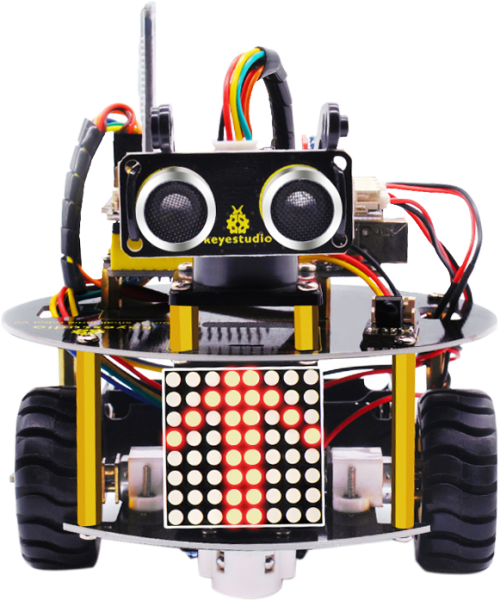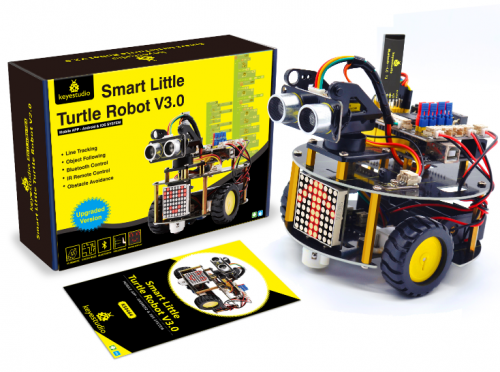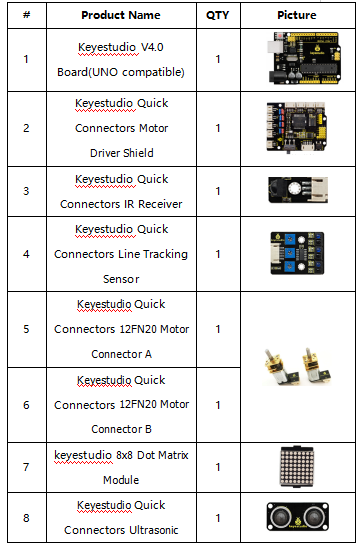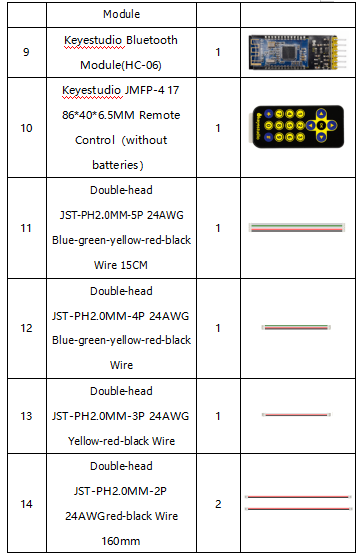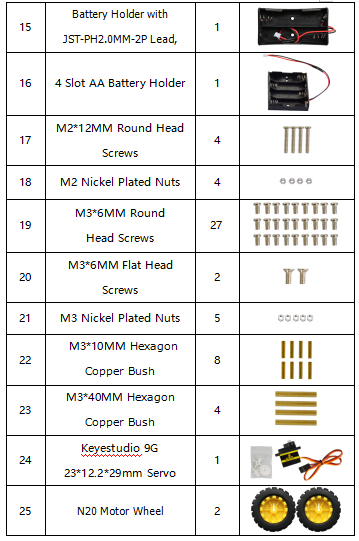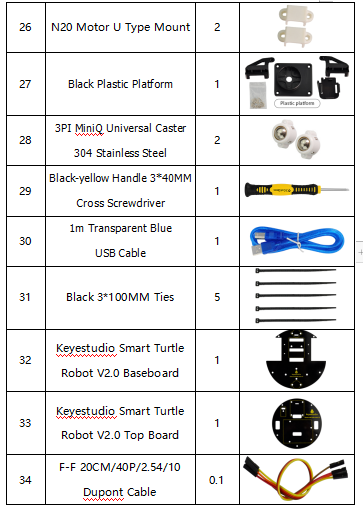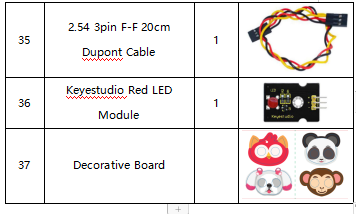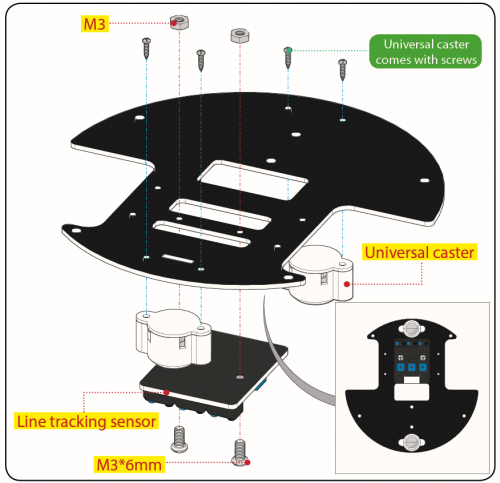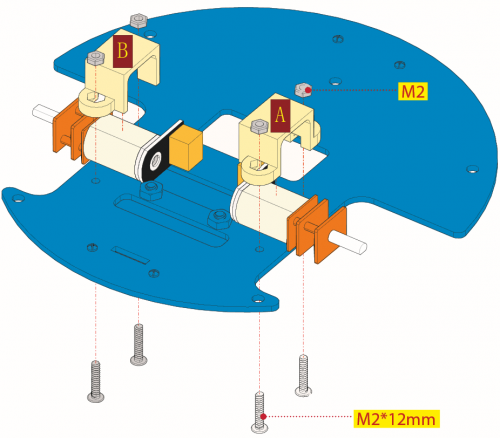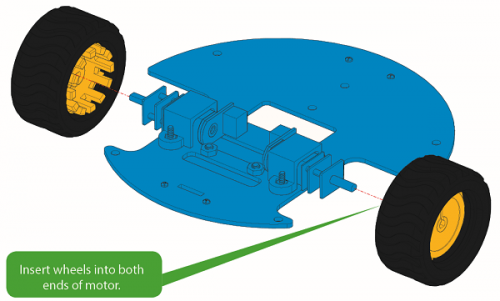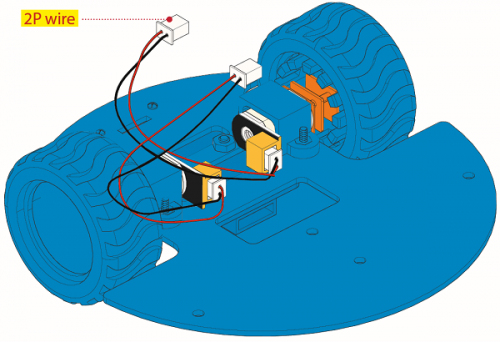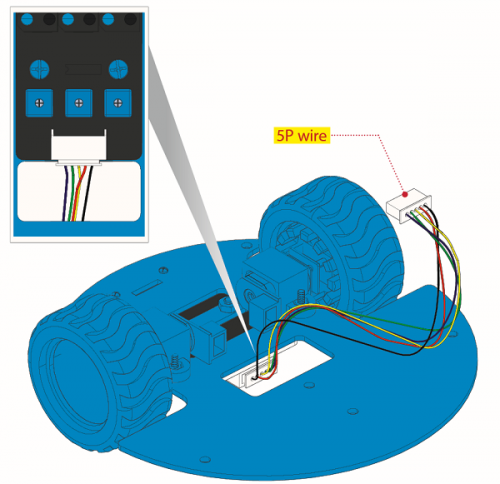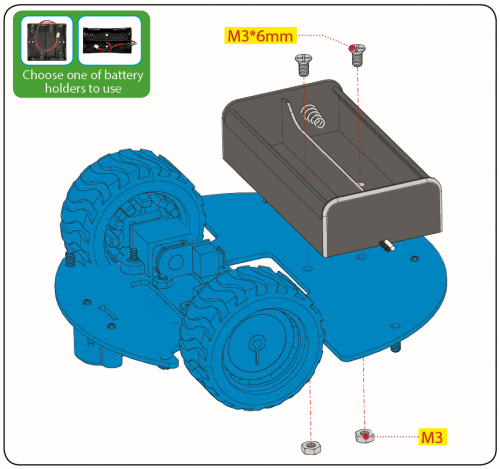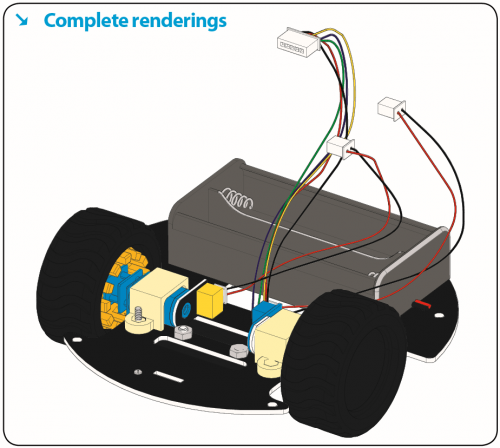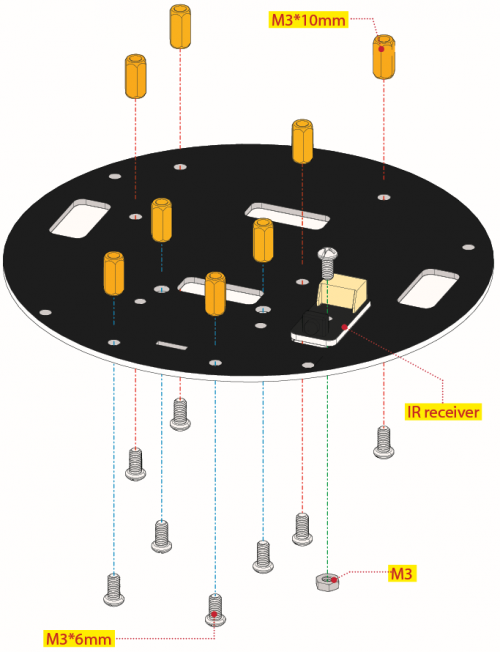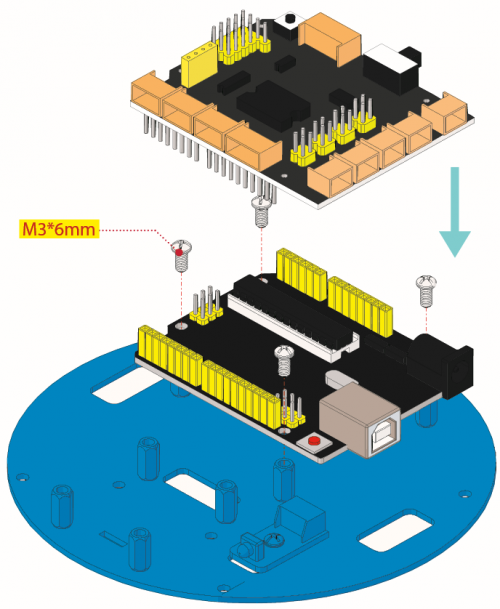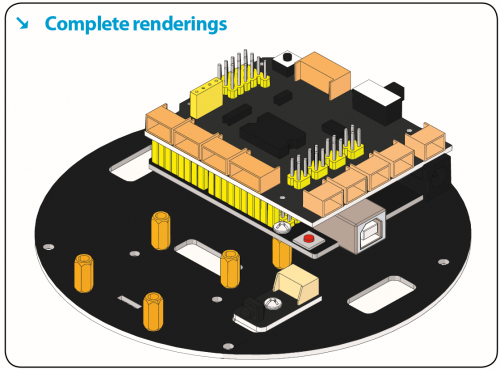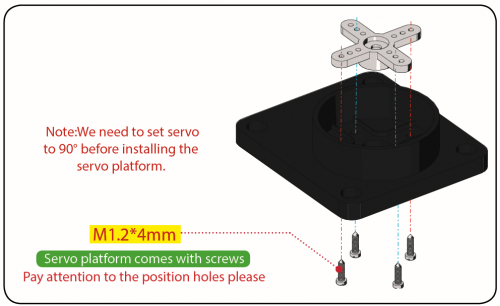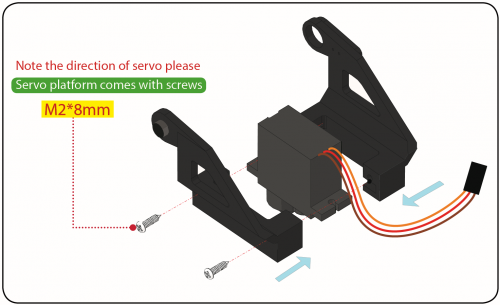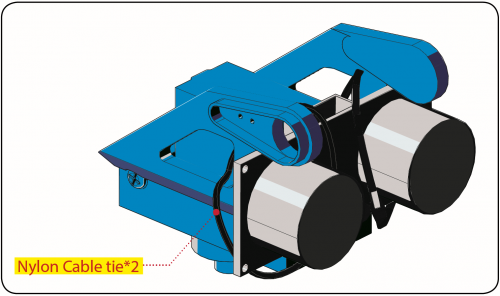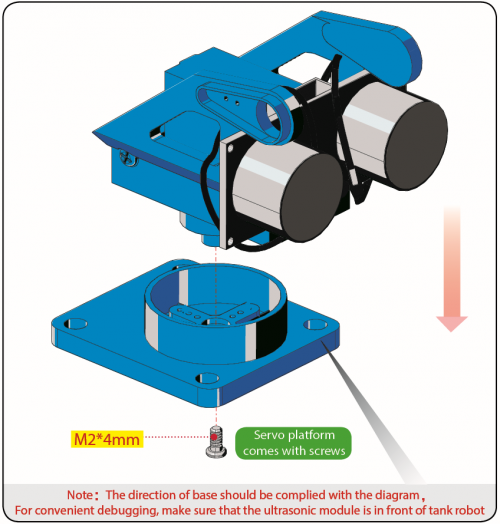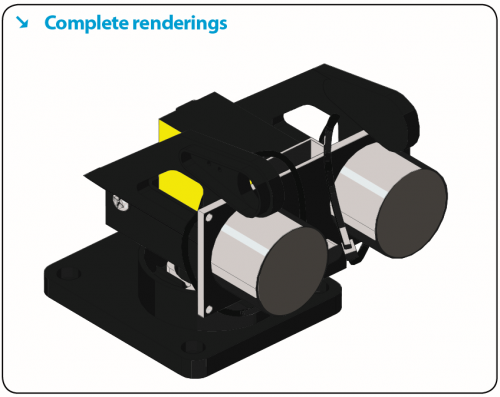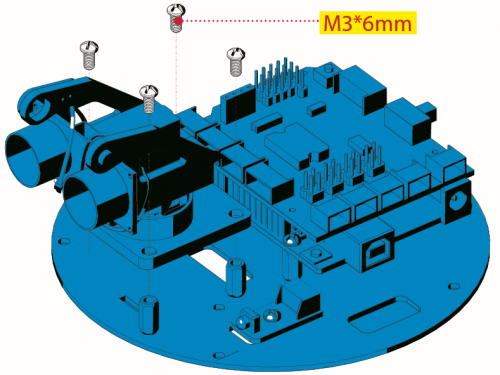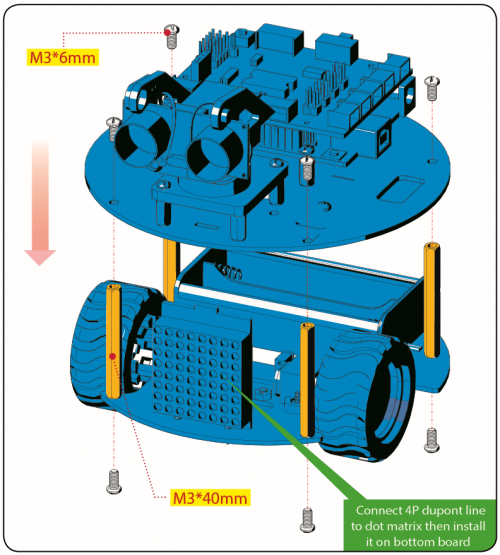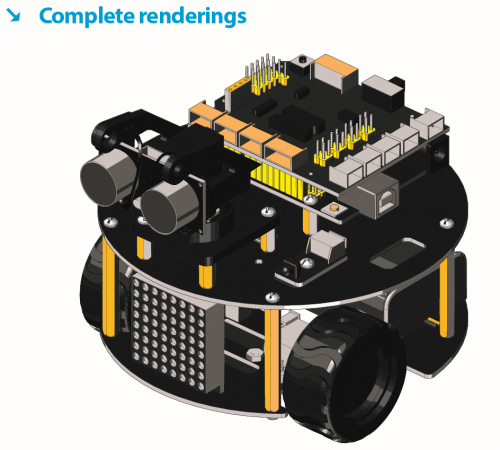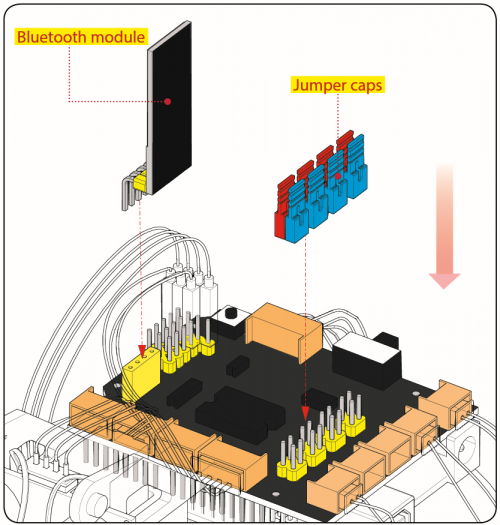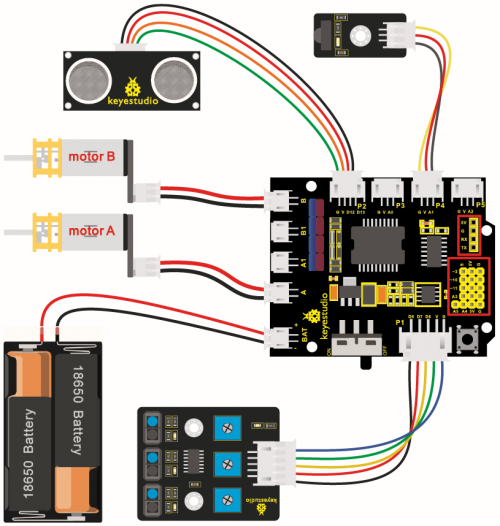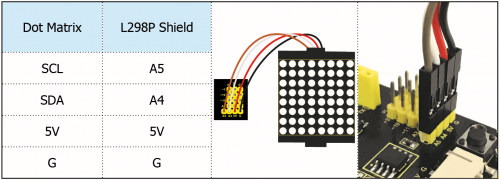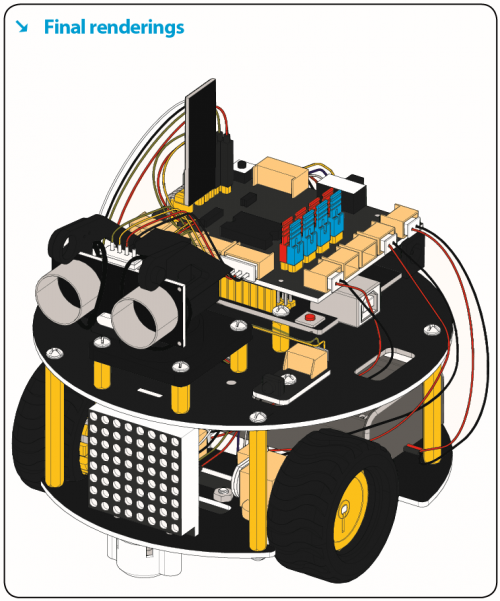KS0464 KEYESTUDIO Smart Little Turtle Robot V3: Difference between revisions
Keyestudio (talk | contribs) |
Keyestudio (talk | contribs) |
||
| Line 92: | Line 92: | ||
Prepare the parts as follows: | Prepare the parts as follows: | ||
* M3*6MM Round Head Screw *2 | * M3*6MM Round Head Screw *2 | ||
| Line 104: | Line 105: | ||
* M3*6M Flat Head Screw *2 | * M3*6M Flat Head Screw *2 | ||
* M3 Nut *2 | * M3 Nut *2 | ||
<br>[[File:0464=9.png|500px|frameless|thumb]]<br> | <br>[[File:0464=9.png|500px|frameless|thumb]]<br> | ||
| Line 122: | Line 125: | ||
<br>[[File:0464=15.png|500px|frameless|thumb]]<br> | <br>[[File:0464=15.png|500px|frameless|thumb]]<br> | ||
Step 4: Mount Control Board | Step 4: Mount Control Board | ||
| Line 130: | Line 134: | ||
* Motor Drive Shield V2*1 | * Motor Drive Shield V2*1 | ||
* M3*6MM Round Head Screw *4 | * M3*6MM Round Head Screw *4 | ||
<br>[[File:0464=16.png|500px|frameless|thumb]]<br> | <br>[[File:0464=16.png|500px|frameless|thumb]]<br> | ||
<br>[[File:0464=17.png|500px|frameless|thumb]]<br> | <br>[[File:0464=17.png|500px|frameless|thumb]]<br> | ||
Step 5: Servo Plastic Platform | Step 5: Servo Plastic Platform | ||
| Line 144: | Line 152: | ||
* M1.2*4 Tapping Screw *4 | * M1.2*4 Tapping Screw *4 | ||
* M2*8 Tapping Screw *2 | * M2*8 Tapping Screw *2 | ||
<br>[[File:0470---21.png|500px|frameless|thumb]]<br> | <br>[[File:0470---21.png|500px|frameless|thumb]]<br> | ||
| Line 150: | Line 160: | ||
<br>[[File:0464=21.png|500px|frameless|thumb]]<br> | <br>[[File:0464=21.png|500px|frameless|thumb]]<br> | ||
<br>[[File:0464=22.png|500px|frameless|thumb]]<br> | <br>[[File:0464=22.png|500px|frameless|thumb]]<br> | ||
| Line 160: | Line 171: | ||
* 8x8 Dot Matrix *1 | * 8x8 Dot Matrix *1 | ||
* Jumper Wire *4 | * Jumper Wire *4 | ||
<br>[[File:0464=23.png|500px|frameless|thumb]]<br> | <br>[[File:0464=23.png|500px|frameless|thumb]]<br> | ||
| Line 165: | Line 178: | ||
<br>[[File:0464=25.png|500px|frameless|thumb]]<br> | <br>[[File:0464=25.png|500px|frameless|thumb]]<br> | ||
<br>[[File:0464=26.png|500px|frameless|thumb]]<br> | <br>[[File:0464=26.png|500px|frameless|thumb]]<br> | ||
Step 7: Hook-up Guide | Step 7: Hook-up Guide | ||
Revision as of 16:08, 16 November 2020
Thanks for your support on our products, we will continue to provide you better quality and service!
About keyestudio
Keyestudio is a best-selling brand owned by KEYES Corporation, our product lines range from Arduino boards, shields, sensor modules, Raspberry Pi, micro:bit extension boards and smart car to complete starter kits designed for customers of any level to learn Arduino knowledge.
All of our products comply with international quality standards and are greatly appreciated in a variety of different markets throughout the world.
Welcome check more contents from our official website:
http://www.keyestudio.com
References and After-sales Service
1.Download Profile:https://fs.keyestudio.com/KS0464
2.Feel free to contact us please, if there is missing part or you encounter some troubles. Welcome to send email to us:service@keyestudio.com. We will update projects and products continuously based on your sincere advice.
Warning
1.This product contains tiny parts(screws, copper pillars), keep it out of reach of children under 7 years old please..
2.This product contains conductive parts (control board and electronic module). Please operate according to the requirements of this tutorial. Improper operation may cause overheating and damage parts. Do not touch and immediately disconnect the circuit power.
Copyright
The keyestudio trademark and logo are the copyright of KEYES DIY ROBOT co.,LTD. All products under keyestudio brand can’t be copied, sold and resold without authorization by anyone or company. If you’re interested in our items, please contact to our sales representatives: fennie@keyestudio.com
Introduction
Nowadays, technological education such as VR, kids programming, and artificial intelligence, has become mainstream in educational industry.
Thereby, people attach importance to STEAM education. Arduino is pretty notable in Maker education.
So what is Arduino? Arduino is an open-source electronics platform based on easy-to-use hardware and software. Arduino boards are able to read inputs - light on a sensor, a finger on a button, or a Twitter message - and turn it into an output - activating a motor, turning on an LED, publishing something online. Based on this, Keyestudio team has designed a turtle robot. It has a processor which is programmable using the Arduino IDE, to mapped its pins to sensors and actuators by a shield that plug in the processor, it reads sensors and controls the actuators and decides how to operate.
15 learning projects, from simple to complex, will guide you how to make a smart turtle robot on you own and introduce the detailed knowledge about sensors and modules.
Simultaneously, it is the best choice if you intend to obtain a DIY robot for learning programming, entertainment and competition requirement.
Features
- Multi-purpose function: Obstacle avoidance, follow, IR remote control, Bluetooth control, ultrasonic follow and displayed face emoticons.
- Simple assembly: No soldering circuit required, complete assembly easily.
- High Tenacity: Aluminum alloy bracket, metal motors, high quality wheels and tracks
- High extension: expand other sensors and modules through motor driver shield and sensor shield
- Multiple controls: IR remote control, App control(iOS and Android system)
- Basic programming:C language code of Arduino IDE.
Specification
- Working voltage: 5v
- Input voltage: 7-12V
- Maximum output current: 2A
- Maximum power dissipation: 25W (T=75℃)
- Motor speed: 5V 63 rpm/min
- Motor drive mode: dual H bridge drive
- Ultrasonic induction angle: <15 degrees
- Ultrasonic detection distance: 2cm-400cm
- Infrared remote control distance: 10M (measured)
- Bluetooth remote control distance: 50M(measured)
- Bluetooth control: support Android and iOS system
Product Kit
Assembly Guide
Step 1: Bottom Motor Wheel
Prepare the parts as follows:
- M3*6MM Round Head Screw *2
- M3*6MM Flat Head Screw *2
- M3 Nickel Plated Nut *2
- Bottom PCB*1
- Tracking Sensor *1
- Universal Caster *2
Step 2:Assemble Parts
Prepare the parts as follows:
- M3*6MM Round Head Screw *2
- M2 Nut *4
- 12FN20 Motor *2
- U-type Holder* 2
- N20 Motor Wheel *2
- 2P Wire *2
- 5P Wire *1
- M2*12MM Round Head Screw *4
- 2-cell AA Battery Holder *1
- M3*6M Flat Head Screw *2
- M3 Nut *2
Step 3: Install Top PCB Prepare the parts as follows:
- Top PCB *1
- M3 Nut *1
- M3*6MM Round Head Screw *9
- M3*10MM Hexagon Copper Bush *8
- IR Receiver Sensor *1
Step 4: Mount Control Board
Prepare the parts as follows:
- V4.0 Board*1
- Motor Drive Shield V2*1
- M3*6MM Round Head Screw *4
Step 5: Servo Plastic Platform Prepare the parts as follows:
- Servo *1
- M2*4 Screw *1
- Black Tie*2
- Ultrasonic Sensor*1
- Black Plastic Platform *1
- M1.2*4 Tapping Screw *4
- M2*8 Tapping Screw *2
Step 6: Final Assembly
Prepare the parts as follows:
- M3*6MM Round Head Screw *12
- M3*40MM Hexagon Copper Bush*4
- 8x8 Dot Matrix *1
- Jumper Wire *4
Step 7: Hook-up Guide
